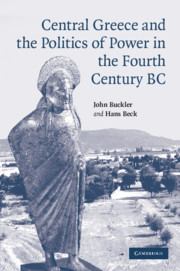Book contents
- Frontmatter
- Contents
- List of maps
- Preface
- Acknowledgments
- List of abbreviations
- Prologue
- Part I ALLIANCE
- Part II HEGEMONY
- Part III DOMINATION
- Chapter 14 Thebes, Delphi, and the outbreak of the Sacred War
- Chapter 15 Pammenes, the Persians, and the Sacred War
- Chapter 16 Philip II, the Greeks, and the King, 346–336 BC
- Chapter 17 A note on the battle of Chaeronea
- Chapter 18 Philip II's designs on Greece
- Epilogue
- Glossary
- References
- Index
Chapter 14 - Thebes, Delphi, and the outbreak of the Sacred War
from Part III - DOMINATION
Published online by Cambridge University Press: 22 September 2009
- Frontmatter
- Contents
- List of maps
- Preface
- Acknowledgments
- List of abbreviations
- Prologue
- Part I ALLIANCE
- Part II HEGEMONY
- Part III DOMINATION
- Chapter 14 Thebes, Delphi, and the outbreak of the Sacred War
- Chapter 15 Pammenes, the Persians, and the Sacred War
- Chapter 16 Philip II, the Greeks, and the King, 346–336 BC
- Chapter 17 A note on the battle of Chaeronea
- Chapter 18 Philip II's designs on Greece
- Epilogue
- Glossary
- References
- Index
Summary
In the aftermath of the battle of Mantinea in 362 Xenophon gave his own gloomy, but accurate, view of the political situation in Greece: “Still more confusion and disorder occurred in Greece after the battle than before” (Hell. 7, 5, 27). His words proved true in their own day and prophetic for the future. Even before he wrote this melancholy opinion, trouble loomed at the sanctuary of Pythian Apollo in Delphi that would prove him right. The problem arose unexpectedly as early as 363, the year before Mantinea. All of the available evidence points to a combination of local strife and outside interference. In the spring of 363 the representatives of the Amphictyonic Council, the hieromnēmones, under the presidency of Andronicus of Crannon, banished Astycrates and ten other prominent Delphians. The Delphic officials next confiscated their property. The refugees found a haven in Athens, where Astycrates received Athenian citizenship and exemption from taxes, both worthy honors. His colleagues acquired isopoliteia, equal citizenship with the Athenians. The Athenians in turn used the occasion to accuse the hieromnēmones of having violated the laws of Delphi and those of the Amphictyonic League. Then at war with most of the other Amphictyons, the Athenians had obvious motives for making a spurious accusation, but nothing compels others to believe it.
These events provide a unique incident in Greek history, for they constitute the only documented instance of the Amphictyons' intervening in the internal affairs of a member state.
- Type
- Chapter
- Information
- Publisher: Cambridge University PressPrint publication year: 2008

